英语组教研活动记录
期末教研英语活动记录(3篇)

第1篇活动时间:2023年6月15日活动地点:学校多功能厅参与人员:英语教研组全体教师活动主题:期末英语教学质量提升与反思活动记录:一、活动开场上午9点,英语教研组全体教师准时到达多功能厅,活动在轻松愉快的氛围中开始。
首先,教研组长李老师对本次活动的目的和意义进行了简要介绍,强调了期末教学质量提升的重要性,并期待通过本次教研活动,共同探讨提升教学质量的有效途径。
二、教学经验分享1. 张老师分享张老师以“如何在期末复习阶段提高学生英语听力水平”为主题,分享了自己的教学经验。
她提到,在复习阶段,教师应注重培养学生良好的听力习惯,通过多种听力材料,如英语歌曲、电影片段等,激发学生的学习兴趣。
同时,张老师还强调了课堂互动的重要性,鼓励学生在课堂上积极发言,提高听力反应速度。
2. 王老师分享王老师针对“如何提高学生英语口语表达能力”这一话题,分享了她的教学心得。
她认为,在口语教学中,教师应注重培养学生的语感和语调,通过角色扮演、小组讨论等形式,让学生在轻松愉快的氛围中提高口语水平。
此外,王老师还强调了教师自身口语表达能力的提升,以身作则,为学生树立良好的榜样。
3. 刘老师分享刘老师针对“如何有效提高学生英语写作能力”进行了经验分享。
她提到,在写作教学中,教师应注重培养学生的思维能力,通过分析范文、总结写作技巧等方式,帮助学生掌握英语写作的基本规律。
同时,刘老师还强调了批改作文的重要性,及时反馈,帮助学生发现并改正错误。
三、教学反思与讨论在经验分享环节结束后,全体教师针对期末教学进行了反思与讨论。
大家纷纷结合自身教学实践,提出了以下问题:1. 如何在短时间内提高学生的英语成绩?2. 如何激发学生的学习兴趣,提高课堂参与度?3. 如何针对不同层次的学生,制定个性化的教学方案?4. 如何提高教师自身的专业素养,更好地服务于教学?针对这些问题,老师们进行了深入的探讨,并提出了以下建议:1. 制定科学合理的复习计划,确保复习内容全面、系统。
英语教研活动记录12篇

英语教研活动记录12篇英语教研活动记录12篇英语教研活动记录(一):活动时光:20xx年10月29日活动地点:班级教室项目名称:英语教研活动项目负责人:xxx活动主题:公开课主讲人:xxx参加对象:部分教师活动资料及进程:三位教师在本次的校级英语教研活动中,每人上了一节校级公开课。
课后三位教师都详细的阐述了自我的教学设计。
课后交流的过程中,听课教师都发表了意见及看法。
活动反思与提议:英语学科的教师较少,课堂教学研讨的形式就显得单一,同时活动的主题尚未构建,在以后的活动中能够从学校的教学实际、学生的学习实际出发构建一个主题,围绕主题开展研讨,或许会更有效果。
英语教研活动记录(二):活动资料:评课主持人:宋燿天活动时光:60分钟活动地点:办公室参加人员:全体英语教师活动资料:期末将至,最近我们教研组几位教师都完成了教研组公开课。
今日就陈玉教师的公开课,进行了热烈地探讨。
很多时候,评课的时候常常”离题万里”,天马行空地聊了开去。
往往在评一个教师的课时,话题会迁移到另外一个教师的教学环节的设计与处理上去;在评课的时候也不断产生并抛出话题,引起各位教师的共鸣与探讨。
这样的”漫无主题”,其实是更深层次的研讨;这样的”游离主题”,其实是更深刻地研讨。
叶文教师:这节课设计大胆、新颖,创意十分好。
教师对教材重、难点的把握比较扎实。
陆建华教师:这节课中背景图片都是日常的生活场景,十分有亲切感,能够激发学生学习兴趣。
宋燿天教师:陈教师的教学设计每次都有其独特之处,除了能够显示教师的教学本事,也能够体现教师的教学创新意识和本事。
教学永远没有最好的方法,仅有最适合的方法。
陈教师的教学理念,十分有时代气息。
在课堂教学中十分重视口语练习,着重学生口语交际本事的培养。
坚持下去对学生是十分有好处的。
课堂教学中,难点处理得十分好。
喻丽娟教师:练习题形式十分好,触类旁通,给我自我教学中产生了新的思路。
以后我在自我的教学中也采取类似的方案。
学校英语教研活动记录(3篇)

第1篇活动时间:2021年11月15日活动地点:学校多功能厅活动主题:提升英语教学效果,促进学生核心素养发展活动参与人员:英语教研组全体教师一、活动背景随着新课程改革的深入推进,英语教学越来越注重学生的核心素养培养。
为了进一步提升我校英语教学质量,促进教师专业成长,学校英语教研组决定开展以“提升英语教学效果,促进学生核心素养发展”为主题的教研活动。
二、活动流程1. 开场致辞活动伊始,教研组长李老师对本次活动进行了简要介绍,强调了教研活动的重要性,并希望全体教师积极参与,共同探讨英语教学中的问题,提高教学质量。
2. 经验分享(1)教师A分享:《基于核心素养的英语阅读教学策略》教师A结合自身教学实践,从阅读教学目标、教学方法和评价方式三个方面,详细阐述了如何将核心素养融入英语阅读教学。
她强调,教师在教学过程中要关注学生的阅读兴趣,引导学生积极参与,提高阅读能力。
(2)教师B分享:《运用多媒体技术提高英语课堂教学效果》教师B介绍了如何利用多媒体技术辅助英语教学,通过图片、视频、音频等多种形式,激发学生的学习兴趣,提高课堂参与度。
她认为,多媒体技术在英语教学中的应用,有助于丰富教学内容,提高教学效果。
3. 互动讨论(1)针对教师A的分享,教师们纷纷提出自己的看法。
有的教师认为,阅读教学要注重培养学生的阅读习惯,提高阅读速度和理解能力;有的教师则提出,在阅读教学中,要关注学生的个性化需求,开展分层教学。
(2)针对教师B的分享,教师们就多媒体技术的应用展开了热烈讨论。
有的教师表示,多媒体技术确实有助于提高课堂效果,但也要注意避免过度依赖,以免影响学生的自主学习能力。
4. 总结与反思教研组长李老师对本次活动进行了总结,她指出,本次教研活动取得了圆满成功,教师们在交流中碰撞出许多有益的教学思路。
她强调,英语教学要关注学生的核心素养,注重培养学生的语言能力、文化意识和思维品质。
同时,教师要积极探索新的教学方法,提高教学效果。
英语教研活动记录12篇
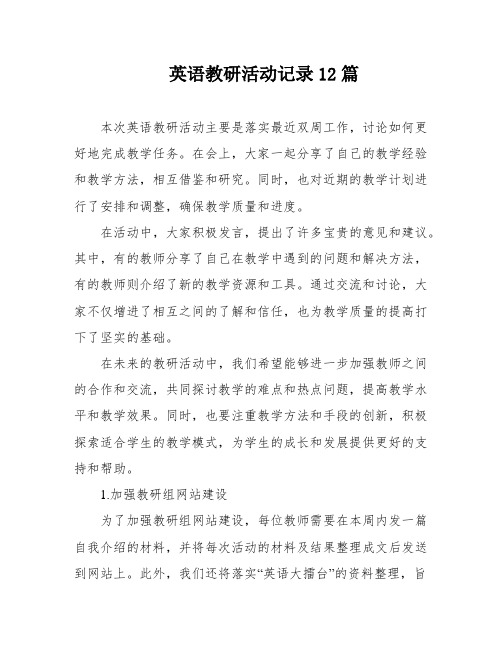
英语教研活动记录12篇本次英语教研活动主要是落实最近双周工作,讨论如何更好地完成教学任务。
在会上,大家一起分享了自己的教学经验和教学方法,相互借鉴和研究。
同时,也对近期的教学计划进行了安排和调整,确保教学质量和进度。
在活动中,大家积极发言,提出了许多宝贵的意见和建议。
其中,有的教师分享了自己在教学中遇到的问题和解决方法,有的教师则介绍了新的教学资源和工具。
通过交流和讨论,大家不仅增进了相互之间的了解和信任,也为教学质量的提高打下了坚实的基础。
在未来的教研活动中,我们希望能够进一步加强教师之间的合作和交流,共同探讨教学的难点和热点问题,提高教学水平和教学效果。
同时,也要注重教学方法和手段的创新,积极探索适合学生的教学模式,为学生的成长和发展提供更好的支持和帮助。
1.加强教研组网站建设为了加强教研组网站建设,每位教师需要在本周内发一篇自我介绍的材料,并将每次活动的材料及结果整理成文后发送到网站上。
此外,我们还将落实“英语大擂台”的资料整理,旨在培养学生研究英语的兴趣,收集活动材料及成果。
本周五中午,我们还将组织“五年级英语朗读比赛”。
2.学生英语活动为了提高学生的英语阅读理解能力,我们在本次教研活动中分享了如何提高英语阅读理解本事的方法。
同时,我们也鼓励全组成员共同研究唐小妮老师今年申请的县级小课题。
3.加强教学的过程性研究教研组内有同轨教师开始了过程性的教学研究,即每单元上课前,同轨教师进行教学再设计,明确教学重难点的突破与训练,分工完成课件制作,之后再根据个人教学特色对课件进行个性化的修改。
这样的研究比较实际,也体现了过程性的合作与探讨。
我们还将落实下周的教研组公开课时光,执教者为贾怡教师和蔡惠红教师。
我们提倡听课时重点记录听课体会与心得,而并非记录整个教学过程。
4.教研活动笔记与教育博客建设每次教研组公开课后,三位青年教师将撰写听课笔记,并将教研组教育博客建立与链接,充分发挥博客的互动功能。
通过这些活动,我们希望能够更好地提高教师们的教学水平,以便更好地服务于学生的研究。
英语教研组教研活动记录(3篇)

第1篇Date: [Insert Date]Time: [Insert Time]Location: [Insert Location]Participants: [List all participants' names and positions]Facilitator: [Name of the facilitator]Objective: To discuss current trends in English language teaching, share best practices, and plan for upcoming professional developmentactivities.---I. IntroductionThe English Research and Teaching Group (ERTG) met today to discuss the latest developments in English language teaching (ELT) and to share insights from recent professional readings and experiences. The meeting was facilitated by [Facilitator's Name], who welcomed all participants and set the tone for the day's discussions.II. Current Trends in ELTThe first part of the meeting focused on current trends in ELT. Participants shared their observations and insights from various sources, including educational conferences, journals, and online resources.1. Technology Integration: [Facilitator's Name] presented a summary of a recent article highlighting the increasing use of technology in ELT. Participants discussed the benefits and challenges of integrating technology into their classrooms, including the need for training and access to resources.2. Student-Centered Learning: A lively debate ensued regarding the effectiveness of student-centered learning approaches. Some members shared their success stories, while others expressed concerns about student engagement and behavior management.3. Globalization and Multilingualism: The group acknowledged the growing importance of multilingualism in the global context. Discussion focused on how to prepare students for the complexities of living in a multilingual world.III. Best Practices SharingFollowing the trend discussion, participants engaged in a round-table sharing of best practices. Each member presented a technique or strategy that they have found particularly effective in their teaching.1. [Participant's Name]: Shared a method for incorporating peer feedback into writing assignments, which has significantly improved students' writing skills.2. [Participant's Name]: Discussed the use of authentic materials, such as news articles and videos, to engage students and make lessons more relevant.3. [Participant's Name]: Explained a game-based learning approach that has been successful in motivating students to practice speaking and listening skills.IV. Case Studies and AnalysisTo further deepen understanding and practical application, the group analyzed several case studies provided by the facilitator. These case studies covered a range of ELT scenarios, including classroom management, curriculum design, and assessment strategies.1. Case Study 1: The group discussed a situation where a teacher was struggling to manage a diverse class with varying language proficiency levels. Suggestions included differentiated instruction and the use of cooperative learning activities.2. Case Study 2: Participants debated the effectiveness of astandardized test used to assess students' language proficiency. The discussion highlighted the importance of alternative assessment methods and the need for a balanced approach.V. Upcoming Professional Development ActivitiesThe final part of the meeting focused on planning upcoming professional development activities. Participants proposed various ideas, which were then discussed and refined.1. Workshop on Technology in ELT: A half-day workshop will be organized to explore the use of technology in ELT, including hands-on activities and best practice sharing.2. Guest Speaker Series: The group agreed to invite a renowned ELT expert to speak on the topic of student-centered learning. The eventwill be open to all faculty members.3. Curriculum Development Workshop: A collaborative project to develop a new curriculum for intermediate-level students will begin in the next month. Participants will be involved in designing lesson plans, activities, and assessment tools.VI. ConclusionThe meeting concluded with a summary of the key points discussed and an agreement on the next steps for each proposed activity. Participants expressed their gratitude to the facilitator for organizing the meeting and acknowledged the value of collaborative learning in enhancing their professional growth.VII. Action Items- [Facilitator's Name] to coordinate with the IT department for the technology workshop.- [Participant's Name] to prepare the workshop materials for the guest speaker series.- [Participant's Name] to lead the curriculum development project.Date for Next Meeting: [Insert Date]---This record provides a comprehensive overview of the ERTG's research activity, showcasing the group's commitment to staying informed about current trends in ELT and to fostering a culture of continuous professional development.第2篇Date: March 15, 2023Location: Conference Room 301, Main BuildingTime: 2:00 PM - 5:00 PMParticipants:- Mr. John Smith, Head of English Department- Ms. Jane Doe, Senior English Teacher- Mr. Michael Chen, Junior English Teacher- Ms. Sarah Kim, ESL Teacher- Ms. Emily Zhang, Curriculum Developer- Ms. Lily Wu, Learning Support SpecialistObjective:The objective of this教研活动 was to discuss and evaluate the current state of English language teaching in our school, identify areas for improvement, and develop strategies to enhance the overall learning experience for our students.Agenda:1. Welcome and Opening Remarks2. Current State of English Language Teaching3. Identifying Areas for Improvement4. Strategies for Enhancing Learning5. Feedback and Recommendations6. Conclusion and Next Steps1. Welcome and Opening RemarksMr. John Smith, the Head of English Department, welcomed allparticipants and provided an overview of the purpose of the教研活动. He emphasized the importance of continuous improvement in teaching methods and student learning outcomes.2. Current State of English Language TeachingMs. Jane Doe, a senior English teacher, presented an overview of the current state of English language teaching in our school. Shehighlighted the strengths, such as high student engagement and positive feedback from students, but also pointed out areas of concern, such as inconsistent vocabulary coverage and lack of personalized learning opportunities.3. Identifying Areas for ImprovementThe group engaged in a lively discussion to identify specific areas where improvements could be made. The following points were raised:- Vocabulary Coverage: There was a consensus that the current curriculum could benefit from a more structured approach to vocabulary teaching, ensuring that all students are exposed to a broad and relevant range of words.- Personalized Learning: The need for more personalized learning experiences was emphasized, especially for students with varying levels of proficiency. This could include differentiated assignments and individualized feedback.- Technology Integration: The group agreed that integrating technology into the classroom could enhance student engagement and provide additional learning resources.- Assessment Methods: There was a desire to explore alternative assessment methods that could provide a more comprehensive picture of student learning, beyond traditional exams.4. Strategies for Enhancing LearningBased on the identified areas for improvement, the group brainstormed several strategies to enhance learning:- Structured Vocabulary Program: Develop a structured vocabulary program that includes regular vocabulary quizzes, word banks, and vocabulary-rich reading materials.- Differentiated Instruction: Implement differentiated instruction techniques, such as tiered assignments and learning stations, to cater to the diverse needs of students.- Technology Integration: Introduce educational technology tools, such as interactive whiteboards, online learning platforms, and educational apps, to engage students and provide additional learning opportunities.- Alternative Assessment: Explore alternative assessment methods, such as portfolios, presentations, and project-based assessments, to assess student learning in a more holistic manner.5. Feedback and RecommendationsEach participant provided feedback on the proposed strategies and offered recommendations for implementation. The following points were made:- Professional Development: It was suggested that the school provide professional development opportunities for teachers to enhance their skills in differentiated instruction and technology integration.- Resource Allocation: The group recommended allocating additional resources, such as textbooks and educational technology, to support the implementation of the proposed strategies.- Regular Monitoring: It was emphasized that regular monitoring and evaluation of the strategies' effectiveness were crucial to ensure continuous improvement.6. Conclusion and Next StepsMr. John Smith concluded the教研活动 by summarizing the key points discussed and outlining the next steps:- Develop a detailed plan for the structured vocabulary program, including timelines and resources.- Schedule professional development workshops for teachers on differentiated instruction and technology integration.- Allocate additional resources to support the implementation of the proposed strategies.- Set up a monitoring and evaluation framework to assess the effectiveness of the strategies.The教研活动 concluded with a sense of optimism and commitment to enhancing the quality of English language teaching in our school. The group expressed a desire to continue working together and supporting each other in the pursuit of excellence in education.End of Record第3篇Date: March 15, 2023Location: Online Conference PlatformDuration: 2 hoursAttendees: All English teachers from Grade 1 to Grade 12---I. IntroductionThe English Research and Development Group (ERDG) met today to discuss the current state of English language education in our school, to share innovative teaching strategies, and to plan for upcoming projects and professional development opportunities. The meeting was moderated by Ms. Smith, the head of the ERDG.---II. Agenda Items1. Current State of English Language Education2. Innovative Teaching Strategies3. Student Performance Analysis4. Upcoming Projects and Initiatives5. Professional Development Opportunities6. Closing Remarks---III. Current State of English Language EducationMs. Johnson, the English department chair, began the meeting by presenting a comprehensive overview of the current state of English language education in our school. She highlighted the following points:- Student Engagement: The department has noticed a decline in student engagement, particularly in lower grades.- Resource Allocation: There is a need for additional resources, such as textbooks and technology, to enhance the learning experience.- Teacher Training: Continuous professional development is essential to keep up with the latest teaching methodologies.---IV. Innovative Teaching StrategiesMr. Lee, a seasoned English teacher, shared some innovative teaching strategies that he has implemented in his classroom. These included:- Flipped Classroom: Students watch video lessons at home and come to class ready to engage in discussions and activities.- Project-Based Learning: Students work on real-world projects that require them to apply their English skills in a practical context.- Gamification: Incorporating games and competitions into lessons to make learning more enjoyable and motivating.The group discussed these strategies and agreed that they could be adapted to different grade levels and subjects.---V. Student Performance AnalysisMs. Wang, the school's data analyst, presented the results of the recent English proficiency tests. The key findings were:- Overall Improvement: There has been a slight improvement in overall performance, particularly in writing and listening skills.- Grade-Level Differences: There is a significant gap in performance between different grade levels, with lower grades showing more room for improvement.- Gender Differences: There is a notable difference in performance between male and female students, with females generally outperforming males.The group brainstormed potential reasons for these differences and discussed ways to address them.---VI. Upcoming Projects and InitiativesMs. Smith announced the following upcoming projects and initiatives:- English Day: A school-wide event scheduled for May 15th to celebrate the importance of the English language.- Teacher Exchange Program: An opportunity for teachers to observe and learn from colleagues at other schools.- Student Debating Club: A new club that will help students improvetheir public speaking and critical thinking skills.The group discussed the logistics and responsibilities associated with each project.---VII. Professional Development OpportunitiesMs. Brown, the professional development coordinator, informed the group about several upcoming opportunities:- Summer Workshop: A week-long workshop focused on integrating technology into the classroom.- Online Courses: A selection of online courses available to teachers interested in specific areas of English language education.- Webinars: Regular webinars on various teaching topics hosted by renowned educators.The group expressed interest in participating in these opportunities and discussed how to allocate time and resources for professional development.---VIII. Closing RemarksMs. Smith concluded the meeting by summarizing the key points discussed and thanking everyone for their contributions. She emphasized the importance of collaboration and continuous improvement in English language education and encouraged the group to stay engaged and supportive of each other.---IX. Next Steps- Ms. Johnson will prepare a detailed action plan to address the issues raised during the meeting.- Ms. Smith will distribute the meeting minutes and follow-up on the projects and initiatives mentioned.- The ERDG will meet again on June 15, 2023, to review progress and discuss future strategies.End of Meeting---Note: This record has been compiled based on the meeting's minutes and discussions. It is intended to serve as a reference for future planning and improvement in English language education at our school.。
英语教研组活动研讨记录(3篇)

第1篇Date: March 15, 2023Location: Online Meeting PlatformParticipants: [List of Participants]Moderator: [Moderator's Name]Minutes Taker: [Minutes Taker's Name]I. IntroductionThe English Research and Teaching Group met today to discuss recent trends in English language teaching, share best practices, and address any challenges faced by teachers in the classroom. The meeting was well-attended, with all members actively participating in the discussions.II. Opening RemarksThe moderator, [Moderator's Name], welcomed all participants and provided a brief overview of the agenda for the day. The main objectives were to:1. Explore new methodologies and techniques for teaching English effectively.2. Share experiences and strategies for managing diverse student needs.3. Discuss the integration of technology in English language teaching.4. Address any specific issues or concerns raised by the group members.III. New Methodologies and Techniques1. Discussion on Inquiry-Based Learning (IBL):- [Participant 1] presented a case study on implementing IBL in an English class. The group discussed the benefits and challenges of this approach, including student engagement and assessment.- [Participant 2] shared resources and activities that can be used to facilitate IBL in the classroom.- The group agreed that IBL is a valuable approach that promotes critical thinking and autonomy in students.2. Flipped Classroom Model:- [Participant 3] explained the flipped classroom model and its potential to enhance student learning outside the classroom.- Participants discussed the practicalities of implementing this model, such as creating engaging video content and managing time effectively.- The group decided to explore this model further and share their experiences at the next meeting.IV. Managing Diverse Student Needs1. Differentiated Instruction:- [Participant 4] highlighted the importance of differentiated instruction in catering to diverse student needs.- The group shared various strategies for differentiation, such as creating tiered assignments, providing additional support for struggling students, and incorporating varied learning activities.- It was agreed that ongoing assessment and feedback are crucial for successful differentiation.2. English Language Learners (ELLs):- [Participant 5] discussed the challenges faced by ELLs in English language classrooms and shared resources for supporting their learning.- The group agreed on the need for creating a supportive andinclusive classroom environment for ELLs, including providing opportunities for them to practice English and develop confidence.- It was suggested that regular training on cultural sensitivity and language acquisition strategies for ELLs be provided to all teachers.V. Integration of Technology in English Language Teaching1. Digital Resources:- [Participant 6] presented a list of useful digital resources for English language teaching, including online dictionaries, grammar tools, and educational apps.- The group discussed the importance of selecting appropriate resources that align with learning objectives and are accessible to all students.- It was agreed that teachers should be trained on how to effectively integrate technology into their teaching practices.2. Online Learning Platforms:- [Participant 7] shared insights on using online learning platforms for virtual classes and discussed the benefits and limitations of this approach.- The group agreed that online learning platforms can be a valuable tool for providing flexibility and personalized learning experiences, but they also require careful planning and management.- It was suggested that the group explore specific platforms and share their findings at the next meeting.VI. Addressing Specific Issues and Concerns1. Classroom Management:- [Participant 8] raised concerns about classroom management, particularly in large classes.- The group discussed various strategies for effective classroom management, such as setting clear expectations, using positive reinforcement, and maintaining a consistent routine.- It was agreed that teachers should seek support from school administrators when necessary.2. Teacher Development:- [Participant 9] highlighted the importance of ongoing professional development for teachers.- The group discussed the need for regular training sessions, workshops, and networking opportunities to enhance teaching skills and stay updated with the latest trends in English language teaching.- It was proposed that the school organize a series of professional development workshops for teachers in the coming months.VII. ConclusionThe English Research and Teaching Group concluded the meeting with a positive outlook on the future of English language teaching. The discussions today provided valuable insights and practical strategies that can be implemented in the classroom. The group expressed gratitude to all participants for their active involvement and shared commitment to improving English language education.Next Steps:1. Implementing Inquiry-Based Learning (IBL) in classrooms and sharing experiences at the next meeting.2. Exploring the flipped classroom model and its integration into teaching practices.3. Sharing resources and best practices for differentiated instruction and supporting ELLs.4. Investigating online learning platforms and their potential benefits for English language teaching.5. Organizing professional development workshops for teachers to enhance their teaching skills.Meeting Adjourned.第2篇Date: March 15, 2023Location: Online Conference PlatformAttendees:- Mr. John Smith, Head of English Department- Mrs. Lisa Wang, Senior English Teacher- Mr. Mark Zhang, Junior English Teacher- Mrs. Emily Liu, Curriculum Developer- Ms. Grace Chen, Learning Technology Specialist- Ms. Daisy Yang, Student RepresentativeFacilitator: Mrs. Lisa WangAgenda:1. Review of the current English curriculum2. Discussion on effective teaching strategies3. Introduction of new learning technologies4. Evaluation of student performance and feedback5. Future planning and goals---I. Review of the Current English CurriculumMr. John Smith:Good morning, everyone. Let's begin with a review of our current English curriculum. We have been using the XYZ English series for the past three years, and I would like to hear everyone's thoughts on its effectiveness and areas that need improvement.Mrs. Lisa Wang:I agree with John. The XYZ series has its strengths, especially in grammar and vocabulary. However, I feel that the reading sections arenot challenging enough for our advanced students. They often find the texts too simplistic.Mr. Mark Zhang:I concur with Lisa. Additionally, I've noticed that some students struggle with the writing component. The prompts are sometimes too broad, and students are not always clear on what is expected of them.Mrs. Emily Liu:I've been working on developing a more structured approach to writing. We could introduce a series of writing frameworks that guide students through the process, from brainstorming to revision.Discussion:The group discussed various aspects of the curriculum, including the need for more challenging reading materials, clearer writing guidelines, and the integration of technology to enhance learning.---II. Discussion on Effective Teaching StrategiesMs. Grace Chen:I would like to introduce a new learning technology that we could use in our classes. It's called 'Flipped Classroom'. In this approach, students watch instructional videos at home and come to class ready to engage in activities and discussions.Mrs. Lisa Wang:That sounds interesting, Grace. How would this work in our current curriculum?Ms. Grace Chen:We could assign a video on a specific grammar topic or a reading excerpt for students to watch at home. In class, we could then focus on applying that knowledge through interactive exercises and group projects.Mr. Mark Zhang:I think this could be particularly beneficial for students who are shyor reticent to speak in front of the class. They can practice their language skills at home and then feel more confident in class discussions.Mrs. Emily Liu:I also see potential in using this approach for vocabulary building. We could create a series of videos that introduce new words and phrases in context, making them more memorable for students.Discussion:The group enthusiastically discussed the potential of the flipped classroom model and other strategies such as cooperative learning,project-based learning, and formative assessments to enhance student engagement and learning outcomes.---III. Introduction of New Learning TechnologiesMrs. Lisa Wang:Let's talk about integrating new learning technologies into our teaching. We've heard about some great tools like Kahoot!, Quizizz, and Google Classroom. How can we incorporate these into our lessons?Ms. Daisy Yang:I love using Kahoot! for quick formative assessments. It's a fun way to check if students understand the material without making them feel embarrassed if they get the answer wrong.Mr. Mark Zhang:I've started using Quizizz in my classes. It's great for individual practice and also allows me to track student progress over time.Mrs. Emily Liu:Google Classroom has been a game-changer for us. It's a convenient platform for distributing materials, collecting assignments, and providing feedback. Plus, it's accessible from anywhere, which is especially useful for students who are absent.Discussion:The group explored various digital tools and discussed how they could be used to create interactive and engaging lessons, as well as tofacilitate communication and collaboration among students and teachers.---IV. Evaluation of Student Performance and FeedbackMrs. Lisa Wang:Moving on to student performance, I've noticed that our end-of-term assessments have been consistently improving. However, I'm concerned about the feedback we're receiving from students regarding their learning experiences.Ms. Daisy Yang:I've had several students express that they feel overwhelmed by the amount of homework we assign. They find it difficult to manage their time and balance their academic responsibilities.Mr. Mark Zhang:I agree. Perhaps we could offer more flexible deadlines or provide guidance on time management strategies.Mrs. Emily Liu:I think it's also important to consider the diversity of learning styles in our classes. Some students might prefer visual or auditory learning,while others might be more kinesthetic. We could incorporate a variety of teaching methods to cater to these different needs.Discussion:The group discussed ways to address student concerns and improve their learning experiences. They agreed on the importance of providing feedback on feedback, creating a supportive classroom environment, and offering support for students who are struggling.---V. Future Planning and GoalsMr. John Smith:Finally, let's discuss our future planning and goals. What do we want to achieve in the next academic year?Mrs. Lisa Wang:I'd like to see our students become more confident and proficient in English. We should focus on enhancing their reading, writing, speaking, and listening skills.Mr. Mark Zhang:I think it's also crucial to encourage our students to think critically and creatively. We could introduce more debate and discussion activities into our curriculum.Mrs. Emily Liu:I would like to see us incorporate more real-world projects into our lessons. This would help students see the relevance of English in their future careers and personal lives.Ms. Grace Chen:We should also continue to explore and integrate new technologies to keep our lessons fresh and engaging.Discussion:The group outlined specific goals for the upcoming year, including the development of a more comprehensive assessment strategy, the introduction of new teaching methods, and the continuous integration of technology in the classroom.---Conclusion:The English Research and Teaching Group meeting was productive and insightful. The group identified areas for improvement in the current curriculum, explored new teaching strategies and technologies, and set ambitious goals for the future. With continued collaboration and dedication, the English department is poised to provide an exceptional learning experience for all students.第3篇一、活动时间:2021年9月30日二、活动地点:学校会议室三、活动主题:探讨如何提高英语教学质量,促进学生英语能力的全面发展四、活动参与人员:英语教研组成员、学校领导五、活动内容:1. 活动开场活动开始,教研组长简要介绍了本次研讨的主题和目的,强调了提高英语教学质量的重要性,并鼓励大家积极参与讨论。
制定英语教研组活动记录(3篇)

第1篇一、活动时间:2021年9月20日二、活动地点:学校会议室三、活动主题:提高英语教学质量,促进学生全面发展四、活动目的:1. 分析本学期英语教学情况,找出存在的问题和不足;2. 共同探讨提高英语教学质量的策略和方法;3. 促进教师之间的交流与合作,共同提高教学水平;4. 关注学生全面发展,提高学生的英语素养。
五、活动内容:1. 总结本学期英语教学情况(1)教师发言:各年级英语教师对本学期教学情况进行总结,包括教学进度、教学效果、学生学习情况等。
(2)组长点评:针对各年级教师的教学情况,教研组长进行点评,肯定优点,指出不足。
2. 分析存在问题(1)教师发言:各年级教师结合自身教学实践,分析存在的问题,如:教学方法单一、课堂管理不到位、学生参与度不高、英语素养培养不足等。
(2)组长点评:针对存在的问题,教研组长提出改进措施,如:丰富教学方法、加强课堂管理、提高学生参与度、关注学生英语素养等。
3. 探讨提高英语教学质量的策略和方法(1)教师发言:各年级教师分享提高英语教学质量的策略和方法,如:采用任务型教学法、开展英语角活动、利用多媒体技术辅助教学等。
(2)组长点评:针对教师提出的策略和方法,教研组长进行点评,强调要结合实际情况,灵活运用。
4. 关注学生全面发展,提高学生英语素养(1)教师发言:各年级教师讨论如何关注学生全面发展,提高学生英语素养,如:开展课外阅读、组织英语演讲比赛、鼓励学生参加英语角等。
(2)组长点评:针对教师提出的措施,教研组长进行点评,强调要关注学生的个体差异,因材施教。
5. 教学经验交流(1)优秀教师发言:邀请优秀英语教师分享教学经验,如:如何激发学生学习兴趣、如何提高学生英语口语表达能力等。
(2)教师讨论:各年级教师结合自身教学实践,讨论如何借鉴优秀教师的经验,提高自己的教学水平。
六、活动总结本次英语教研组活动圆满结束,达到了预期目的。
通过本次活动,教师们明确了本学期英语教学的重点和难点,提高了对提高英语教学质量的认识,为今后的教学工作奠定了基础。
英语教研活动记录12篇
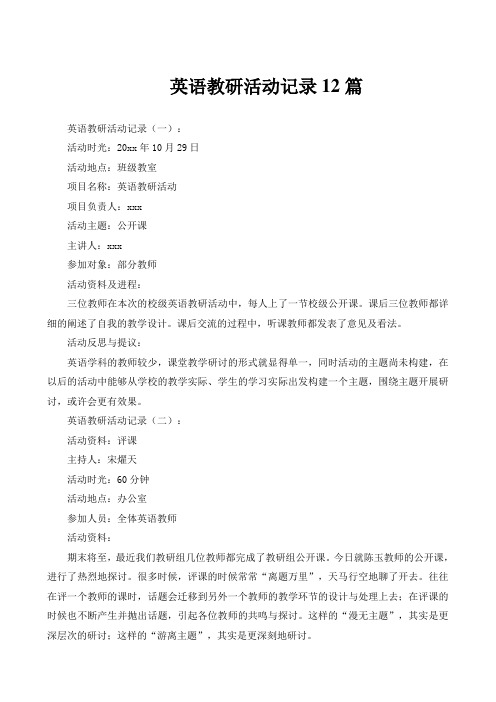
英语教研活动记录12篇英语教研活动记录(一):活动时光:20xx年10月29日活动地点:班级教室项目名称:英语教研活动项目负责人:xxx活动主题:公开课主讲人:xxx参加对象:部分教师活动资料及进程:三位教师在本次的校级英语教研活动中,每人上了一节校级公开课。
课后三位教师都详细的阐述了自我的教学设计。
课后交流的过程中,听课教师都发表了意见及看法。
活动反思与提议:英语学科的教师较少,课堂教学研讨的形式就显得单一,同时活动的主题尚未构建,在以后的活动中能够从学校的教学实际、学生的学习实际出发构建一个主题,围绕主题开展研讨,或许会更有效果。
英语教研活动记录(二):活动资料:评课主持人:宋燿天活动时光:60分钟活动地点:办公室参加人员:全体英语教师活动资料:期末将至,最近我们教研组几位教师都完成了教研组公开课。
今日就陈玉教师的公开课,进行了热烈地探讨。
很多时候,评课的时候常常“离题万里”,天马行空地聊了开去。
往往在评一个教师的课时,话题会迁移到另外一个教师的教学环节的设计与处理上去;在评课的时候也不断产生并抛出话题,引起各位教师的共鸣与探讨。
这样的“漫无主题”,其实是更深层次的研讨;这样的“游离主题”,其实是更深刻地研讨。
叶文教师:这节课设计大胆、新颖,创意十分好。
教师对教材重、难点的把握比较扎实。
陆建华教师:这节课中背景图片都是日常的生活场景,十分有亲切感,能够激发学生学习兴趣。
宋燿天教师:陈教师的教学设计每次都有其独特之处,除了能够显示教师的教学本事,也能够体现教师的教学创新意识和本事。
教学永远没有最好的方法,仅有最适合的方法。
陈教师的教学理念,十分有时代气息。
在课堂教学中十分重视口语练习,着重学生口语交际本事的培养。
坚持下去对学生是十分有好处的。
课堂教学中,难点处理得十分好。
喻丽娟教师:练习题形式十分好,触类旁通,给我自我教学中产生了新的思路。
以后我在自我的教学中也采取类似的方案。
这节课总的比较好,无论教学重、难点的把握,还是教学过程的设计,都比较到位。
英语教研活动记录(12篇)精选
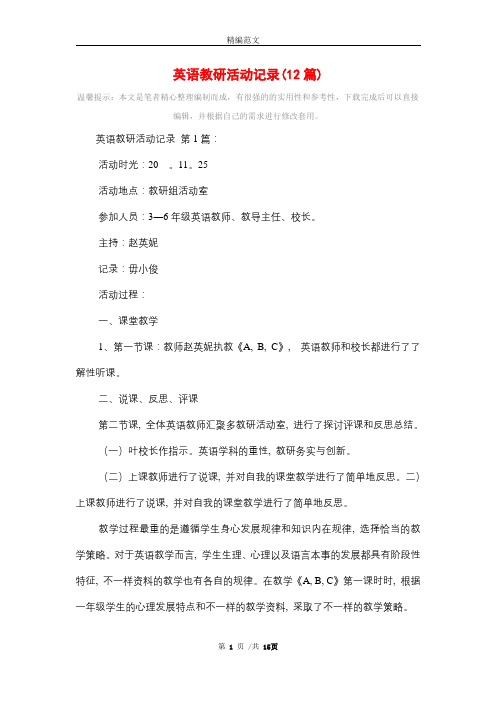
英语教研活动记录(12篇)温馨提示:本文是笔者精心整理编制而成,有很强的的实用性和参考性,下载完成后可以直接编辑,并根据自己的需求进行修改套用。
英语教研活动记录第1篇:活动时光:20__。
11。
25活动地点:教研组活动室参加人员:3―6年级英语教师、教导主任、校长。
主持:赵英妮记录:毋小俊活动过程:一、课堂教学1、第一节课:教师赵英妮执教《A, B, C》, 英语教师和校长都进行了了解性听课。
二、说课、反思、评课第二节课, 全体英语教师汇聚多教研活动室, 进行了探讨评课和反思总结。
(一)叶校长作指示。
英语学科的重性, 教研务实与创新。
(二)上课教师进行了说课, 并对自我的课堂教学进行了简单地反思。
二)上课教师进行了说课, 并对自我的课堂教学进行了简单地反思。
教学过程最重的是遵循学生身心发展规律和知识内在规律, 选择恰当的教学策略。
对于英语教学而言, 学生生理、心理以及语言本事的发展都具有阶段性特征, 不一样资料的教学也有各自的规律。
在教学《A, B, C》第一课时时, 根据一年级学生的心理发展特点和不一样的教学资料, 采取了不一样的教学策略。
一、游戏引领全课在复习导入环节, 我以猜口形的小游戏激发学生学习英语字母的兴趣, 使学生有乐于往下学习的愿望。
二、不一样教学方法贯穿其中在新授课教学环节, 其中一个教学目标就是让学生读准字母Aa 、Bb、Cc 的音。
针对此目标, 我选择了不一样的教学方法。
学习Aa的时候, 用两个小朋友挨在一齐的图来引出Aa的读音, 再让学生反复良好习惯, 体会Aa是怎样发音的。
于是, 学生自然而然的说出先读a, 也能够利用发音方法来回忆、来区分, 这就为今后的学习打下了坚实的基础。
三、教师研讨:(一)、毋小俊:就如何使字母1)、就如何使字母课更加有效?每一环节的落实, 怎样一步一步实施才更加合理等问题, 对赵英妮的字母单词课进行了肯定, 同时也提出了中肯的意见。
使在座的各位教师收获颇丰。
教师英语教研活动记录(3篇)

第1篇活动时间:2023年4月15日,星期五,下午2:00-5:00活动地点:学校多功能厅参与人员:英语教研组全体教师主持人:张晓芳老师活动主题:探讨小学英语课堂有效教学策略活动记录:一、活动开场张晓芳老师首先对本次活动进行了简要介绍,强调了本次教研活动的重要性和目的,即通过集体讨论,提升教师的教学水平,提高英语课堂的教学效果。
二、活动流程1. 经验分享活动伊始,李明老师分享了他在课堂教学中的一些成功经验。
他指出,课堂氛围的营造对于学生的学习兴趣至关重要。
他通过设计富有创意的教学活动,如角色扮演、小组讨论等,激发了学生的学习热情。
2. 案例分析接着,王丽老师分享了一个课堂案例。
在分析这个案例时,她强调了教师应关注学生的个体差异,因材施教。
她通过观察学生的反应,及时调整教学策略,确保每个学生都能在课堂上有所收获。
3. 小组讨论随后,全体教师分为三个小组,针对以下问题进行讨论:(1)如何提高学生的英语听说能力?(2)如何有效利用课堂时间,提高教学效率?(3)如何激发学生的学习兴趣,培养他们的自主学习能力?在讨论过程中,老师们各抒己见,分享了自己的教学心得。
经过一番热烈的讨论,各组分别提出了以下建议:(1)提高学生的英语听说能力:- 创设真实的语言环境,鼓励学生在课堂上多开口说英语;- 开展丰富多彩的课外活动,如英语角、英语演讲比赛等;- 利用多媒体技术,如视频、音频等,丰富教学内容。
(2)有效利用课堂时间,提高教学效率:- 制定详细的教学计划,合理安排教学内容;- 优化教学环节,如减少不必要的讲解,增加互动环节;- 关注学生的反馈,及时调整教学策略。
(3)激发学生的学习兴趣,培养自主学习能力:- 创设有趣的教学情境,让学生在轻松愉快的氛围中学习;- 鼓励学生参与课堂活动,发挥他们的主观能动性;- 培养学生的自我管理能力,让他们学会自主学习。
4. 总结与反思最后,张晓芳老师对本次教研活动进行了总结。
她肯定了老师们在讨论中的积极参与和提出的宝贵建议,并强调以下几点:- 教师应不断提高自身的专业素养,关注学生的学习需求;- 注重课堂氛围的营造,激发学生的学习兴趣;- 创新教学方法,提高教学效率。
英语组教研活动评课记录(3篇)

第1篇一、活动背景为了提高英语组教师的教学水平,加强教师之间的交流与合作,我校英语组于2022年10月18日开展了教研活动。
本次活动以评课为主题,旨在通过观摩、研讨、反思,提升教师的教学能力。
本次活动邀请了校领导、其他学科教师及英语组全体教师参加。
二、活动内容1. 观摩课本次活动由英语组青年教师李老师主讲,课题为《Unit 5 If you go to the party》。
李老师以生动有趣的教学方法,引导学生积极参与课堂活动,课堂气氛活跃。
以下是李老师课堂的主要环节:(1)导入:通过播放一首与课文内容相关的歌曲,激发学生的学习兴趣。
(2)新课呈现:通过图片、视频等多媒体手段,展示课文内容,让学生直观地了解课文。
(3)词汇教学:针对课文中的重点词汇,进行讲解和练习。
(4)语法教学:针对课文中的重点语法,进行讲解和练习。
(5)课文朗读:让学生跟读课文,提高学生的语音、语调。
(6)课堂小结:回顾本节课所学内容,布置课后作业。
2. 评课环节在观摩课后,英语组全体教师对李老师的课堂教学进行了评课。
以下是评课的主要内容:(1)优点:1. 教学目标明确,教学重点突出。
2. 教学方法多样,课堂气氛活跃。
3. 教学内容丰富,注重培养学生的综合语言运用能力。
4. 课堂评价及时,关注学生的个体差异。
(2)不足:1. 部分环节时间分配不合理,如词汇教学环节时间过长。
2. 部分学生参与度不高,课堂互动性有待提高。
3. 课后作业布置过于简单,未能充分调动学生的学习积极性。
三、活动总结1. 通过本次教研活动,英语组教师对课堂教学有了更深入的认识,提高了自身的教学水平。
2. 活动中,教师们积极参与评课,提出了许多有针对性的意见和建议,有助于李老师改进教学。
3. 活动充分展示了英语组教师团结协作、共同进步的精神风貌。
四、改进措施1. 教师应合理安排课堂时间,确保教学环节的完整性。
2. 注重学生的个体差异,提高课堂互动性,激发学生的学习兴趣。
教研组研讨英语活动记录(3篇)

第1篇一、活动背景随着我国英语教学改革的不断深入,英语教师的教学理念和方法也在不断更新。
为了提高英语教学质量,促进教师的专业发展,我校英语教研组于2023年3月15日开展了主题为“创新英语教学策略,提升学生英语素养”的研讨活动。
本次活动旨在通过集体研讨,探讨如何运用创新的教学策略,激发学生学习英语的兴趣,提升学生的英语综合素养。
二、活动时间及地点活动时间:2023年3月15日(星期三)下午2:00-5:00活动地点:学校多功能厅三、活动参与人员参与人员:英语教研组全体教师、学校领导、部分兄弟学校英语教师四、活动流程1. 开场致辞学校领导对本次研讨活动表示了高度重视,并对英语教研组提出了期望和要求。
2. 主题发言由教研组长王老师做主题发言,王老师结合自身教学经验,分享了“情境教学法在英语教学中的应用”的实践案例,并就如何创设有效的教学情境进行了深入剖析。
3. 分组研讨全体教师分为四个小组,围绕以下议题进行研讨:- 如何运用多媒体技术提高英语课堂教学效果?- 如何激发学生学习英语的兴趣?- 如何培养学生的英语口语表达能力?- 如何进行有效的英语教学评价?4. 小组汇报各小组分别汇报研讨成果,分享创新教学策略和经验。
5. 专家点评邀请了兄弟学校英语教研组长张老师对本次研讨活动进行点评,张老师对教研组的研讨成果给予了充分肯定,并提出了宝贵的意见和建议。
6. 总结发言教研组长王老师对本次研讨活动进行了总结,强调了创新教学策略的重要性,并对今后的英语教学工作提出了新的要求。
五、活动内容1. 情境教学法在英语教学中的应用王老师在主题发言中提到,情境教学法能够有效激发学生的学习兴趣,提高学生的英语实际运用能力。
她以“英语角”为例,详细介绍了如何创设真实的语言环境,让学生在情境中学习、运用英语。
2. 多媒体技术在英语教学中的应用小组一在研讨中提出,多媒体技术能够丰富教学内容,提高课堂教学的趣味性。
他们分享了利用PPT、视频、音频等多媒体资源进行英语教学的成功案例。
英语组主题教研活动记录(3篇)
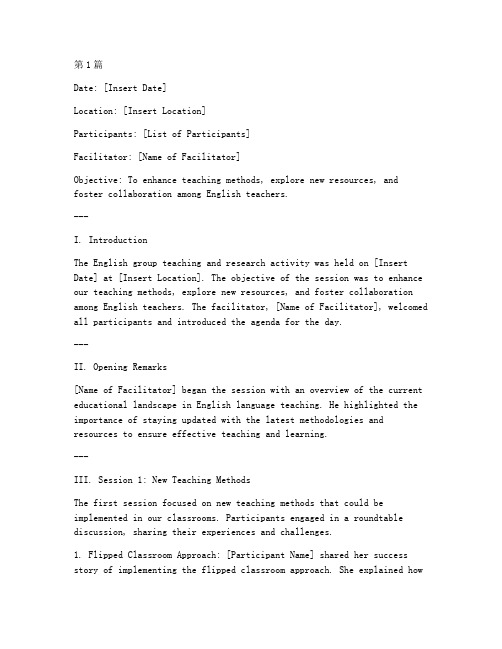
第1篇Date: [Insert Date]Location: [Insert Location]Participants: [List of Participants]Facilitator: [Name of Facilitator]Objective: To enhance teaching methods, explore new resources, andfoster collaboration among English teachers.---I. IntroductionThe English group teaching and research activity was held on [Insert Date] at [Insert Location]. The objective of the session was to enhance our teaching methods, explore new resources, and foster collaboration among English teachers. The facilitator, [Name of Facilitator], welcomed all participants and introduced the agenda for the day.---II. Opening Remarks[Name of Facilitator] began the session with an overview of the current educational landscape in English language teaching. He highlighted the importance of staying updated with the latest methodologies and resources to ensure effective teaching and learning.---III. Session 1: New Teaching MethodsThe first session focused on new teaching methods that could be implemented in our classrooms. Participants engaged in a roundtable discussion, sharing their experiences and challenges.1. Flipped Classroom Approach: [Participant Name] shared her success story of implementing the flipped classroom approach. She explained howthis method allows students to learn new concepts at home and use class time for practical activities and discussions.2. Project-Based Learning: [Participant Name] discussed the benefits of project-based learning, emphasizing how it encourages critical thinking and collaboration among students.3. Gamification: [Participant Name] presented a case study where gamification was used to make learning more engaging and interactive. He demonstrated various tools and resources that can be used to create game-based learning experiences.---IV. Session 2: Resource ExplorationThe second session was dedicated to exploring new resources that could enhance our teaching practices. Participants were divided into small groups to research and present their findings.1. Interactive Learning Platforms: The first group discussed interactive learning platforms such as Kahoot!, Quizizz, and Socrative. They highlighted how these tools can be used for formative assessments and student engagement.2. Educational Podcasts: The second group explored educational podcasts as a resource for both teachers and students. They recommended podcasts like “Grammar Girl” and “The British Council Podcast” for language learning and cultural insights.3. Virtual Reality (VR) and Augmented Reality (AR): The third group presented on the use of VR and AR in English language teaching. They showcased examples of how VR can be used for immersive language learning experiences.---V. Collaborative Lesson PlanningAfter the resource exploration, participants engaged in collaborative lesson planning. Each group was tasked with designing a lesson plan incorporating the new methods and resources discussed during the session.1. Lesson on Descriptive Writing: The first group designed a lesson on descriptive writing using the flipped classroom approach. They suggested recording a video explaining the key features of descriptive writing and assigning related tasks for students to complete at home.2. Lesson on Present Perfect Tense: The second group created a lesson on the present perfect tense using gamification. They planned to use Kahoot! to assess students' understanding and engage them in interactive activities.3. Lesson on Cultural Exchange: The third group developed a lesson on cultural exchange using VR and AR. They proposed a virtual field trip to a different country where students could practice language skills in a real-life context.---VI. Feedback and ReflectionAt the end of the session, participants provided feedback on theactivities and shared their reflections on the day's learning.1. Positive Feedback: Participants expressed their appreciation for the opportunity to collaborate and learn from each other. They found the session to be informative and engaging.2. Challenges and Solutions: Some participants mentioned the need for additional training on certain tools and resources. The group agreed to organize follow-up workshops to address these concerns.3. Future Plans: Participants discussed the possibility of organizing regular teaching and research activities to continue the collaborative learning process.---VII. ConclusionThe English group teaching and research activity was a successful event that provided valuable insights and resources for our teaching practices. The facilitator, [Name of Facilitator], thanked all participants fortheir active participation and dedication. He encouraged everyone to implement the new methods and resources in their classrooms and to continue the collaborative learning journey.---Attachments:- Collaborative lesson plans- List of recommended resources- Feedback form responses---End of Record第2篇活动时间:2023年3月15日(星期三)下午2:00-5:00活动地点:学校多功能厅参与人员:英语教研组全体教师主持人:张晓丽老师记录人:李婷婷老师---一、活动背景随着新课程改革的不断深入,英语教学面临着新的挑战和机遇。
三小英语教研组活动记录(3篇)
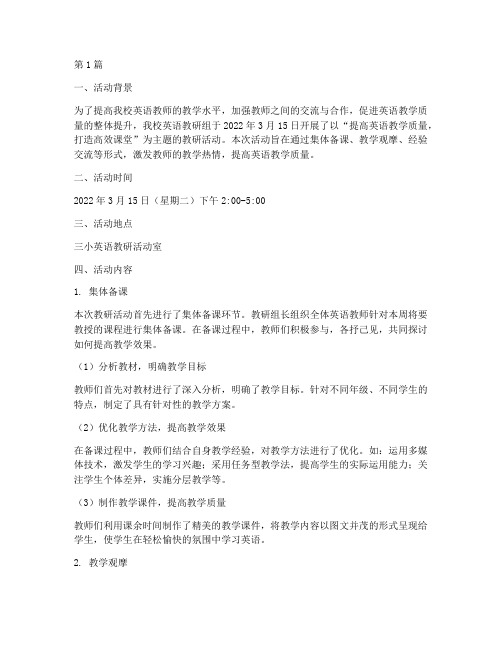
第1篇一、活动背景为了提高我校英语教师的教学水平,加强教师之间的交流与合作,促进英语教学质量的整体提升,我校英语教研组于2022年3月15日开展了以“提高英语教学质量,打造高效课堂”为主题的教研活动。
本次活动旨在通过集体备课、教学观摩、经验交流等形式,激发教师的教学热情,提高英语教学质量。
二、活动时间2022年3月15日(星期二)下午2:00-5:00三、活动地点三小英语教研活动室四、活动内容1. 集体备课本次教研活动首先进行了集体备课环节。
教研组长组织全体英语教师针对本周将要教授的课程进行集体备课。
在备课过程中,教师们积极参与,各抒己见,共同探讨如何提高教学效果。
(1)分析教材,明确教学目标教师们首先对教材进行了深入分析,明确了教学目标。
针对不同年级、不同学生的特点,制定了具有针对性的教学方案。
(2)优化教学方法,提高教学效果在备课过程中,教师们结合自身教学经验,对教学方法进行了优化。
如:运用多媒体技术,激发学生的学习兴趣;采用任务型教学法,提高学生的实际运用能力;关注学生个体差异,实施分层教学等。
(3)制作教学课件,提高教学质量教师们利用课余时间制作了精美的教学课件,将教学内容以图文并茂的形式呈现给学生,使学生在轻松愉快的氛围中学习英语。
2. 教学观摩在集体备课结束后,教研组安排了教学观摩环节。
由两位教师分别进行课堂教学展示,其他教师观摩并给予点评。
(1)观摩教师:张老师教学内容:三年级英语《Unit 3 My family》张老师以“我的家庭”为主题,通过图片、视频等多种形式,让学生了解家庭成员的称呼。
在教学过程中,张老师注重激发学生的学习兴趣,引导学生积极参与课堂活动。
(2)观摩教师:李老师教学内容:五年级英语《Unit 4 What can you do?》李老师以“我能做什么?”为主题,通过情景模拟、角色扮演等教学手段,让学生掌握本节课的单词和句型。
在教学过程中,李老师注重培养学生的口语表达能力,使学生在实际情境中运用所学知识。
校本英语教研活动记录(3篇)

第1篇一、活动时间2023年10月26日,星期四,下午2:00-5:00二、活动地点学校多功能厅三、活动主题“基于核心素养的英语阅读教学策略探讨”四、活动参与人员1. 英语教研组全体成员2. 外聘英语教学专家3. 其他年级英语教师五、活动流程1. 开场致辞(2:00-2:10)- 主持人介绍活动背景和目的,强调教研活动的重要性。
2. 专家讲座(2:10-3:10)- 外聘专家就“基于核心素养的英语阅读教学策略”进行专题讲座。
- 专家从以下几个方面展开讲解:1. 核心素养的内涵与英语阅读教学的关系2. 英语阅读教学的目标与策略3. 如何设计有效的阅读教学活动4. 如何评估阅读教学效果3. 课堂观摩(3:10-4:10)- 由教研组教师进行课堂展示,内容为“人教版小学英语四年级上册 Unit 4 My Home”。
- 观摩结束后,参与教师进行点评,分享教学心得。
4. 分组讨论(4:10-4:50)- 将教师分为三个小组,围绕以下主题进行讨论:1. 如何将核心素养融入英语阅读教学?2. 如何设计多样化的阅读教学活动?3. 如何评估阅读教学效果?- 每组推选一名代表进行总结发言。
5. 总结发言(4:50-5:00)- 主持人对本次教研活动进行总结,强调以下几点:1. 教师要树立核心素养意识,关注学生的全面发展。
2. 要不断探索有效的阅读教学策略,提高教学效果。
3. 要加强团队合作,共同促进英语教学质量的提升。
六、活动内容1. 专家讲座内容(1)核心素养的内涵与英语阅读教学的关系专家指出,核心素养是指学生在终身学习过程中形成的,适应个人终身发展和社会发展需要的必备品格和关键能力。
英语阅读教学是培养学生核心素养的重要途径,教师要关注学生的语言能力、文化意识、思维品质和学习能力等方面的发展。
(2)英语阅读教学的目标与策略专家强调,英语阅读教学的目标是提高学生的阅读理解能力、信息提取能力、语言运用能力和文化理解能力。
英语教研活动记录 优选12篇.doc

英语教研活动记录优选12篇【导语】英语教研活动记录优选12篇由***整理投稿精心推荐,我希望对你的学习工作能带来参考借鉴作用。
【目录】篇1:英语教研活动记录篇2:英语教研活动记录篇3:英语教研活动记录篇4:英语教研活动记录篇5:英语教研活动记录篇6:英语教研活动记录篇7:英语教研活动记录篇8:英语教研活动记录篇9:英语教研活动记录篇10:英语教研活动记录篇11:英语教研活动记录篇12:英语教研活动记录【正文】篇1:英语教研活动记录活动时光:20xx年10月29日活动地点:班级教室项目名称:英语教研活动项目负责人:xxx活动主题:公开课主讲人:xxx参加对象:部分教师活动资料及进程:三位教师在本次的校级英语教研活动中,每人上了一节校级公开课。
课后三位教师都详细的阐述了自我的教学设计。
课后交流的过程中,听课教师都发表了意见及看法。
活动反思与提议:英语学科的教师较少,课堂教学研讨的形式就显得单一,同时活动的主题尚未构建,在以后的活动中能够从学校的教学实际、学生的学习实际出发构建一个主题,围绕主题开展研讨,或许会更有效果。
篇2:英语教研活动记录活动资料:评课主持人:宋燿天活动时光:60分钟活动地点:办公室参加人员:全体英语教师活动资料:期末将至,最近我们教研组几位教师都完成了教研组公开课。
今日就陈玉教师的公开课,进行了热烈地探讨。
很多时候,评课的时候常常“离题万里”,天马行空地聊了开去。
往往在评一个教师的课时,话题会迁移到另外一个教师的教学环节的设计与处理上去;在评课的时候也不断产生并抛出话题,引起各位教师的共鸣与探讨。
这样的“漫无主题”,其实是更深层次的研讨;这样的“游离主题”,其实是更深刻地研讨。
叶文教师:这节课设计大胆、新颖,创意十分好。
教师对教材重、难点的把握比较扎实。
陆建华教师:这节课中背景图片都是日常的生活场景,十分有亲切感,能够激发学生学习兴趣。
宋燿天教师:陈教师的教学设计每次都有其独特之处,除了能够显示教师的教学本事,也能够体现教师的教学创新意识和本事。
公开课英语教研活动记录(3篇)

第1篇活动时间:2023年4月15日活动地点:学校多功能厅活动主题:基于核心素养的英语课堂教学实践与研究参与人员:英语教研组全体教师、校领导、部分其他学科教师一、活动背景随着新课程改革的深入推进,英语学科核心素养的培养已成为教师教学的重要目标。
为了提高英语教学质量,促进教师专业成长,我校英语教研组特举办本次公开课英语教研活动,旨在通过课堂实践与研讨,探讨如何有效落实英语学科核心素养,提升学生英语学习能力和综合素质。
二、活动流程1. 课堂展示本次公开课由我校英语教研组长张老师主讲,课题为《Unit 5 What does he do?》。
张老师以轻松愉快的氛围导入新课,通过图片、视频等多媒体手段激发学生的学习兴趣。
课堂上,张老师注重学生自主学习能力的培养,引导学生通过小组合作、讨论等方式进行探究学习,使学生在互动中提高英语口语表达能力。
2. 课堂点评课后,教研组全体教师对张老师的公开课进行了点评。
首先,大家一致认为张老师的课堂设计合理,教学目标明确,教学方法多样,能够充分调动学生的学习积极性。
同时,张老师注重学生英语学科核心素养的培养,通过多种教学手段提高学生的英语听说读写能力。
3. 研讨交流在研讨交流环节,各位教师就以下问题展开讨论:(1)如何将英语学科核心素养融入课堂教学中?(2)如何提高学生的英语听说读写能力?(3)如何有效利用多媒体手段进行英语教学?(4)如何培养学生的英语学习兴趣?针对以上问题,各位教师结合自身教学实践,分享了各自的经验和心得。
以下是部分教师的发言摘要:(1)李老师:在课堂教学中,我们要关注学生的个体差异,根据学生的实际情况,制定合适的教学目标。
同时,注重培养学生的自主学习能力,鼓励学生积极参与课堂活动。
(2)王老师:多媒体手段在英语教学中具有重要作用。
我们可以利用图片、视频、音频等多种形式,激发学生的学习兴趣,提高课堂效率。
(3)刘老师:培养学生的英语学习兴趣是提高英语教学质量的关键。
大学英语教研组活动记录(3篇)

第1篇活动时间:2023年4月15日活动地点:大学外语教学部会议室活动主题:提升大学英语教学质量,探讨教学方法创新参与人员:大学英语教研组全体成员一、活动背景随着我国高等教育的不断发展,大学英语作为一门基础课程,在培养学生国际视野、提升跨文化交际能力等方面发挥着重要作用。
为了进一步提高大学英语教学质量,满足新时代人才培养需求,大学英语教研组于2023年4月15日召开了本次教研活动。
二、活动内容1. 活动开场活动由大学英语教研组组长张教授主持。
张教授首先对全体教研组成员的到来表示欢迎,并简要介绍了本次活动的目的和意义。
2. 教学经验分享为了促进教研组成员之间的交流与合作,本次活动中,三位资深教师分享了他们的教学经验。
(1)王老师分享了她在课堂管理方面的经验,强调了教师应注重激发学生的学习兴趣,营造良好的课堂氛围。
(2)李老师介绍了她在课程设计方面的创新,通过引入案例教学、情景模拟等方法,提高学生的实际应用能力。
(3)赵老师分享了她在教学评价方面的做法,提出了以形成性评价为主,结合终结性评价的多元化评价体系。
3. 教学方法探讨在教学方法探讨环节,教研组成员就以下问题展开了热烈讨论:(1)如何提高学生的英语听说能力?(2)如何将信息技术融入大学英语教学?(3)如何培养学生的跨文化交际能力?针对这些问题,教研组成员提出了以下建议:(1)加强课堂互动,鼓励学生积极参与讨论,提高口语表达能力。
(2)利用网络资源,如在线课程、英语学习APP等,丰富教学内容,提高学生学习兴趣。
(3)组织学生参加英语角、演讲比赛等活动,提高学生的跨文化交际能力。
4. 教学资源建设为了提升大学英语教学质量,教研组成员就教学资源建设展开了讨论。
大家一致认为,应加强以下几方面的建设:(1)编写适合本校学生的英语教材,注重实用性和趣味性。
(2)建立英语学习资源库,为学生提供丰富的学习资源。
(3)加强教师培训,提高教师的信息技术应用能力和教学水平。
初中英语备课组教研记录(3篇)

第1篇日期:2023年4月15日地点:学校英语教研室参与人员:初中英语备课组全体教师主持人:张老师记录人:李老师---一、会议主题本次教研会议的主题是“探讨初中英语教学中的有效策略与方法”,旨在提高英语教学质量,促进学生英语学习兴趣和能力的提升。
二、会议议程1. 总结上学期教学情况2. 讨论本学期教学计划3. 分享教学经验和案例4. 分析学生常见问题及改进措施5. 教学资源整合与共享6. 会议总结与布置后续工作---三、会议内容1. 总结上学期教学情况张老师首先对上学期英语教学情况进行了总结。
他指出,上学期学生在英语学习上取得了一定的进步,但也存在一些问题,如部分学生对英语学习缺乏兴趣,部分学生在口语表达和听力理解方面存在困难。
2. 讨论本学期教学计划针对上学期的问题,备课组全体教师共同讨论了本学期的教学计划。
主要内容包括:调整教学内容和方法,提高学生学习兴趣:通过引入多媒体教学、游戏化教学等方式,激发学生学习英语的兴趣。
加强口语和听力训练:定期组织口语角、听力竞赛等活动,提高学生的口语表达和听力理解能力。
注重基础知识的巩固和拓展:通过课后作业、单元测试等方式,帮助学生巩固基础知识,并拓展知识面。
3. 分享教学经验和案例在讨论环节,老师们分享了各自的教学经验和案例。
例如,王老师分享了如何通过情境教学提高学生的口语表达能力,李老师分享了如何利用网络资源丰富课堂内容等。
4. 分析学生常见问题及改进措施备课组老师们共同分析了学生在英语学习中的常见问题,如语法错误、词汇记忆困难、阅读理解障碍等,并提出了相应的改进措施。
例如,针对语法错误,可以通过制作语法卡片、开展语法竞赛等方式进行强化训练;针对词汇记忆困难,可以通过词根词缀法、联想记忆法等方法提高记忆效率。
5. 教学资源整合与共享为了提高教学效率,备课组决定整合教学资源,实现资源共享。
具体措施包括:建立英语教学资源库,收集整理优秀教学案例、课件、习题等资源。
- 1、下载文档前请自行甄别文档内容的完整性,平台不提供额外的编辑、内容补充、找答案等附加服务。
- 2、"仅部分预览"的文档,不可在线预览部分如存在完整性等问题,可反馈申请退款(可完整预览的文档不适用该条件!)。
- 3、如文档侵犯您的权益,请联系客服反馈,我们会尽快为您处理(人工客服工作时间:9:00-18:30)。
3、听课。听课前期要了解所听课的教学目标、重点、难点
4、评课。本学期每次评课将围绕一个主题展开。
五、总结:
无规矩不成方圆。所以明确工作纪是为了更好的工作,也是对自己的一种锻炼。因此,我们要积极响应学校制定的纪律要求。
红阳小学教研活动记录
活动主题
如何听课
1、课堂教学中要有“笑声”
2、课堂教学中要有“赞美声”
3、课堂教学中要有“惊讶声”
4.总结
教学中的“三声”,能够拉近教师与学生的距离,使教师与学生心心相通,心心相融。这时的教学定能迸发出成功的火花!
红阳小学教研活动记录
活动主题
如何做到精心备课
活动地点
会议室
参加人员
全体英语教师
活动时间
周一下午
活动过程:
教师听课要高度集中注意力,全身心的投入,还要有虚怀若谷的态度。教师在课堂上不仅要听,还要看,要仔细捕捉讲课者的语言和表情,记下他每个教学环节和教学方法。
三、听课后要思考和整理
在分析总结他人课时要注意比较、研究,取长补短。教学基本功和课前备课情况。这种思考对自己也会有很大帮助。
四、总结
知道了听课的重要性,也明确了听课时的方向。
活动地点
会议室
参加人员
全体英语教师
活动时间
周一下午
活动过程:
一、每次教研活动要求:
1、每次周三进行教研活动,准时开始,不等候迟到的老师,这样才能在时间上保证学习的实效性。
2、听课时请照顾上课老师的情绪和学生听课的专注。若当堂有意见可以采用邻近笔谈的方式交流,不要当堂谈论。
二、规定:
1、备课。书上、网络的资源要充分利用,平行班合作要密切。
田晓岚:1、单词与句型教学没有很好地结合起来
2、学习活动没有很好地调动学生的主动性
吕田芳:1、单词呈现方式多样
2、课前准备充分
3、单词的音、形、义结合
杨宏1、语言扩展很广
2、教师的示范到位
3、板书:单、复数集体呈现
红阳小学教研活动记录
活动主题
新课程下英语教学中的情感教育
活动地点
会议室
参加人员
全体英语教师
红阳小学教研活动记录
活动主题
传达校、教务处工作安排
活动地点
会议室
参加人员
全体英语教师
活动时间
周一下午
活动过程:
一、李主任总结上学期的教研情况:
二、杨校长谈校本研训
1.理论学习选专著,集体学习(为教而学)
2.名师讲座,邀请专家(每月一次)
3.通过教研组总结,交流,推广经验。对个别经验丰富的教师的比较好的作法,请青年教师帮助他们总结、成文、推广。
红阳小学教研活动记录
活动主题
教师该怎样上课
活动地点
会议室
参加人员
全体英语教师
活动时间
周一下午
活动过程:
课堂教学要有“三声”
课堂是教师工作、学生学习的主阵地,怎样构建高效课堂,怎样提高课堂教学质量,是每一名教师所追求的基本目标。在课堂教学中,怎样做到师生心心相融呢?经过大家的研究决定,课堂教学要有“三声”:
周一下午
活动过程:
要减轻学生课业负担,提高课堂教学效率是关键,要向40分钟要质量,教师的课堂教学必须精心设计,课堂上要把握好几点是关键。
1、课堂教学的原则要体现教为主导,学为主体。
2、课堂教学手段要灵活多样和综合利用。
红阳小学教研活动记录
活动主题
如何帮助学困生
活动地点
会议室
参加人员
全体英语教师
活动时间
周一下午
的学习成绩是我们长期探讨的一个焦点问题,依据九年制义务教育的要求来看,以关心,培养每一个学生的角度出发,我们不能让任何一个学生掉队。
文俊艳:在课堂上一般是不太爱举手的,教师应主动叫他们回答问题,并通过表扬他们树立学习的信心。长此以往,他们就逐步转入主动思维的状态。积极为学困生创造思维的条件。
活动地点
会议室
参加人员
全体英语教师
活动时间
周一下午
活动过程:
一、听课前要有一定的准备工作。
打算听谁的课,应该事先问问他教什么内容,把课本找来预习一下,看看课文写的是什么,是怎样写的,有没有难点、疑点;同时自己设想一下,假如让我教这样的课文,准备怎样教法,以便听课时有个对比。。
二、听课中要认真观察和记录
吕田芳:常接近他们,了解他们,走进他们的内心世界,听取他们在学习中的困难和对老师授课的意见,这样做教师既能做到心中有数,以便因材施教、有的放矢,又能与他们沟通,使他们毫无顾忌地发展自己的思维。
总结:
所以,平时的教学中,要经常应用上述方法,不仅使学困生逐步爱学,会学,更重要的是培养他们的兴趣,达到提高学习成绩的目的。
活动时间
周一下午
活动过程
一、理论学习
《情感教育的歧化现象及其分析》
1、简单化
有人认为情感教育是讲课要有表情,待学生要慈爱而已,这是把情感教育简单化。
2、形式化
把情感教育作为引起学生学习兴趣的教学形式。
3、工具化
情感教育的效果无法像知识教育一样外显,也无法用考试的
红阳小学教研活动记录
活动主题
教研组会议
红阳小学教研活动记录
活动主题
学习探讨本学期工作计划
活动地点
会议室
参加人员
全体英语教师
活动时间
周一下午
活动过程:
一、学习,讨论工作计划
1.工作思路
2.主要工作
(1)加强理论学习、转变教学观念
(2)加强教学研究、提高教学效率
(3)改革研究作风、注重课题研究的实效性
(4)坚持多元评价、促进每一位教师和学生健康成长
备课是常规教学的重要环节,是教师实施课堂教学的事先策划;是使课堂教学具有高效的根本保证,也是减轻学生课业负担的前提。精心备课时要做到:
1.备课必须备教材,又备学生。
教师既要钻研大纲,通读教材,领会教材所要达到的教学目标和素质教育的目的,对教学体系,基本内容要熟练掌握。教师又要充分了解班里的每个学生。
4.常规教研
定时间、定地点、定人物
加强教学调研:教育沙龙、学习反思、个案研究、行动研究
学习——研究——交流——反思
5.教育科研与常规教育
6.开拓创新,要有个性,形成特色
7.分层研训,形成梯队
红阳小学教研活动记录
活动主题
研讨文俊艳老师的公开课
活动地点
会议室
参加人员
全体英语教师
活动时间
周一下午
活动过程
大家对文俊艳老师的公开课进行点评
2.备课必须备教法,又备学法。
教法应是建立在学生学法的基础上,是在结合考虑教材、学生、设备和教师自身的特点基础上,再以教学法的体系中优选出上好一堂课的教学方法。
总结
高效的课堂一定是提前的功夫,但功夫也应该下到点上。
红阳小学教研活动记录
活动主题
要向40分钟要效率
活动地点
会议室
参加人员
全体英语教师
活动时间
